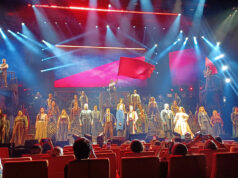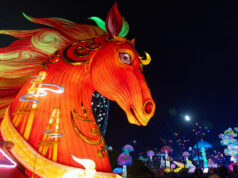The music is fun in Gee Gee at Waterina
By Nickky F. P de Guzman, Reporter
THE music is queen in Gee Gee at Waterina, ang Musikal. The 11 songs, composed by Jesse Lucas, aid in the storytelling and add to the visual spectacle of the one-act play on stage.
The songs are fun and flamboyant. Upbeat songs like “Kon-si-hala,” “True Confession,” and “BFF” elicited giggles from the audience on the night that BusinessWorld watched, while melancholy songs like “Minsan Siyang Naging Akin” and “Huling Habilin” moved the audience as the leads remembered their past and shared their anxieties for the future, but without spoiling the general fun of the entire production. After all, the song and dance numbers feature an all-male ensemble who don skimpy shorts as macho dancers in one scene and then quickly change into ballgowns and blonde wigs for another scene.
Gee Gee at Waterina, ang Musikal is based on real people. Walter Dempster, Jr., better known as Waterina, had been coerced into sex servitude during the Japanese occupation (the late Comedy King Dolphy portrayed his life in the 2000 movie Markova: Comfort Gay), and much later in life Waterina he found himself living in Golden Gays, a retirement home which Pasay councilor Justo C. Justo, a.k.a. Gee Gee, put up for aging homosexual men who had no family able, or willing, to care for them.
Written by Jose Dennis Teodisio, the musical is about the two gay friends who receive a check from Dolphy as payment letting him tell their story in his movie, which was shown in the Metro Manila Film Festival. The bulk of the story revolves around Waterina’s two apprehensions: one, if the moviegoers would learn something from the movie based on his life, and, two, what to do with the paycheck.
Veteran stage actor Roeder B. Camañag is no stranger to the character of Waterina — he has played the character before and has perfected his portrayal of Waterina’s emotions, his qualms and desires, and his happiness and dreams. During the Aug. 17 performance at Arts Above Quezon City, I was made to believe that he was the real-life Waterina.
Norman Peñaflorida, meanwhile, plays Gee Gee, the gay politician who sang the funny song, “Kon-si-hala,” which literally means councilor — but with his emphasis on the last two syllables “hala,” which means to flirt, the sense of the song took a different connotation.
The play opens with Waterina, wearing an floral orange wrap-dress, looking at the mirror, admiring himself, and confirming that he is, indeed, maganda (beautiful). He is singing at the Golden Gays’ rooftop and then something downstairs catches his interest: a young man. He calls to him to come up but is ignored. After some time, Gee Gee, wearing orange jeans and a tank top, joins Waterina on the roof.
Waterina says he’ll give his money to his greatest love and the two go on to sing “Tru Lab” and reminisce about Waterina’s past lovers. To illustrate the song, one by one the ensemble members appear as: a sexy dancer, a tricycle driver, a priest, a plumber, and, lastly, an apron-clad guy whose penis (a prop) dangles in the open. Waterina’s greatest love apparently was Jumbo, who was the town’s kubrador (bet collector).
Because the musical revolves around two flamboyant gays, the jokes are the usual gay tropes we hear in comedy bars and TV shows. When discussing what happened to him during the war, Waterina describes the Japanese soldiers as sakang (bow legged), saying that if the sakang had just told him they wanted sex, he would have agreed anyway — they did not need to rape him. This is the sort of gay joke the play uses which appear funny at first, but there’s really nothing humorous about it.
Before the musical ends, Gee Gee asks his friend if he ever regretted that he chose to live as a flamboyant gay. Waterina says no and the two sing “Out and Proud” and “So What? So What!” and then the whole cast appears on stage in full make up, wigs, glittered gowns, and sky-high heels.
The one-act play closes as it opened. Waterina again sees the young man — now accompanied with another young man. Gee Gee and Waterina — giggling and giddy — call to them to come up to the roof and join them.
Gee Gee at Waterina has performances at Arts Above, West Ave., Quezon City on Aug. 25 and 26, 7 p.m. For tickets go to www.ticketworld.com.ph.
READ: Gee Gee at Waterina: More than a gay story http://www.bworldonline.com/gee-gee-at-waterina-more-than-a-gay-story/



